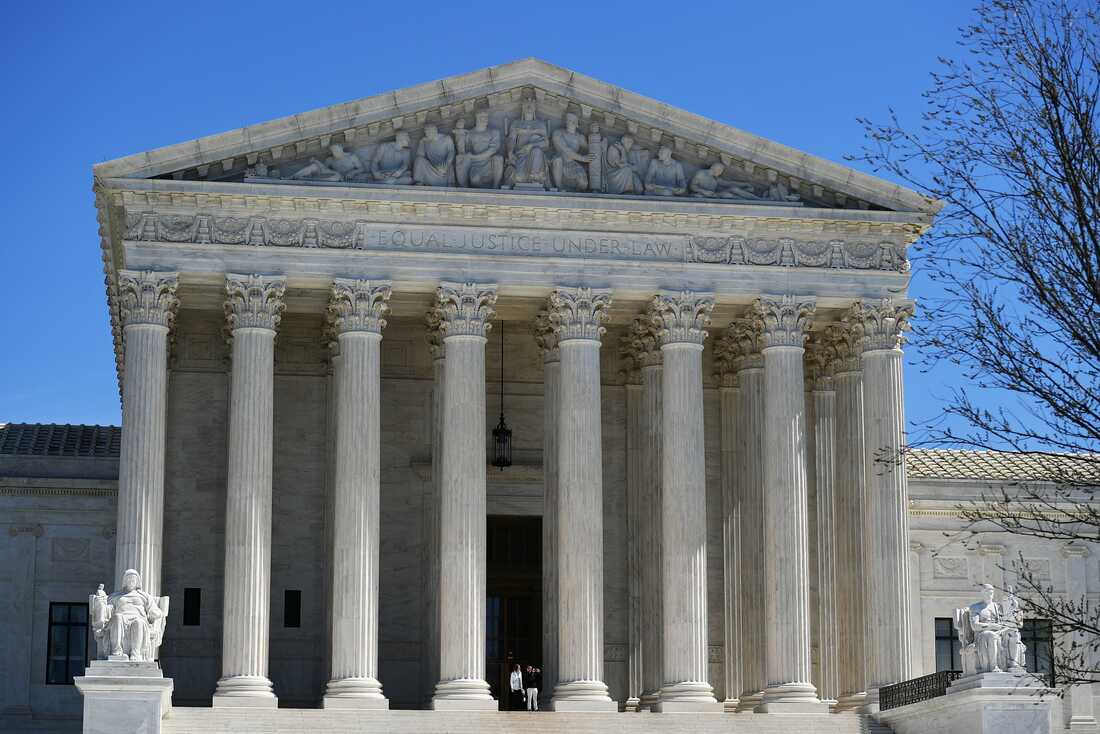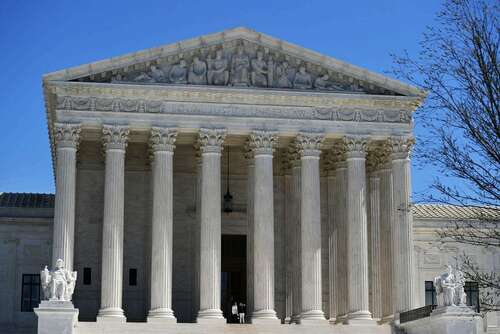
The Supreme Court
Mandel Ngan/AFP/Getty Images
hide caption
toggle caption
Mandel Ngan/AFP/Getty Images

The Supreme Court
Mandel Ngan/AFP/Getty Images
The U.S. Supreme Court on Thursday backed away from a confrontation with the Fifth Circuit Court of Appeals and its efforts to delay the redrawing of Louisiana’s congressional map ahead of the 2024 election.
The case has been widely watched, not just because it could produce an additional Democratic seat in the House, but because the Fifth Circuit’s actions in the case were seen as a defiant challenge to the Supreme Court’s authority.
On Thursday, however, the justices, without explanation or noted dissent, declined to block a highly unusual legal maneuver by the Fifth Circuit that could prevent the creation of a second majority Black district in time for the 2024 election.
But in a concurrence, Justice Ketanji Brown Jackson wrote to “emphasize” that “nothing in our decision not to summarily reverse the Fifth Circuit should be taken to endorse the practice” used by the appeals court to delay the redistricting process “in these or similar circumstances.”
Thursday’s decision was a turnaround for the high court, which, in a similar case in June, ordered the state of Alabama to draw a second competitive district for Black voters. Following that decision, the justices ordered Louisiana to go ahead with its efforts to draw a new map that would comply with the rules set down in the Alabama case.
Now, however, the the justices have declined to intervene further, at least for now, potentially allowing the Fifth Circuit to delay the redistricting process, even as 2024 election deadlines loom.
The Louisiana redistricting dispute centers on the fact that, as of now, the congressional map appears to mirror the racial vote dilution that the Supreme Court found to be illegal in Alabama. Specifically, one-third of Louisiana’s population is Black, but the way the congressional districts have been drawn, only one out of six congressional districts has a majority of Black voters.
How we got here
This is hardly the first rodeo for this case. The Louisiana case has been on hold for 16 months. In 2022 civil rights groups sued the state contending that a second majority or near-majority Black district could be drawn. In June 2022, a federal district court judge agreed that the existing map likely violated the Voting Right Act. But the Fifth Circuit said it was too late–too close to the election–to allow a new map to be drawn. And the Supreme Court agreed by a 6-to-3 vote, along conservative/liberal lines.
Fast forward to this year. Once again redistricting is front and center in Louisiana. Once again, an election is nigh, and once again, the Supreme Court, this time without dissent, has refused to intervene.
The status quo is that the trial court, has found that the existing map drawn by the legislature likely violates the Voting Rights Act. That ruling is still on appeal to the Fifth Circuit. Voting rights experts say that normally, in a situation like this, the courts adopt a two-track approach. While the circuit court considers any appeals, the trial court goes ahead with considering possible alternative maps so they can be ready when and if needed. Or as Justice Jackson put it, “we have previously emphasized this litigation should be resolved ‘in advance of the 2024 elections in Louisiana.'”
But civil rights groups face what Stanford law professor Pamela Karlan calls “a catch-22.” Justice Jackson’s concurrence notwithstanding, the court will be loathe to intervene if the case drags on unresolved. The closer the election is, the less likely the court is to intervene.
“This is just another example of a Southern legislature playing chicken with the courts,” says Karlan. Here the Fifth Circuit told the trial court that it was moving too fast by scheduling a hearing to consider potential alternative maps. Indeed, three weeks ago, a Fifth Circuit panel, by a 2-to-1 vote, took the extraordinary step of cancelling the trial court’s hearing, a procedural step that University of Texas law professor Stephen Vladeck called “stunning.”
The question now is, what happens next? Civil rights groups had asked the Supreme Court to rein in the Fifth Circuit, but the justices have now declined to do that. “They did not untie the knot,” observes Professor Justin Levitt of Loyola Marymount University Law School. And there is every probability that the Fifth Circuit and the state of Louisiana will now “try to run out the clock,” adds UCLA law professor Richard Hasen.
Only one thing is certain in the short run: if the Louisiana redistricting case was a procedural mess before, it still is, as confusion reigns.




